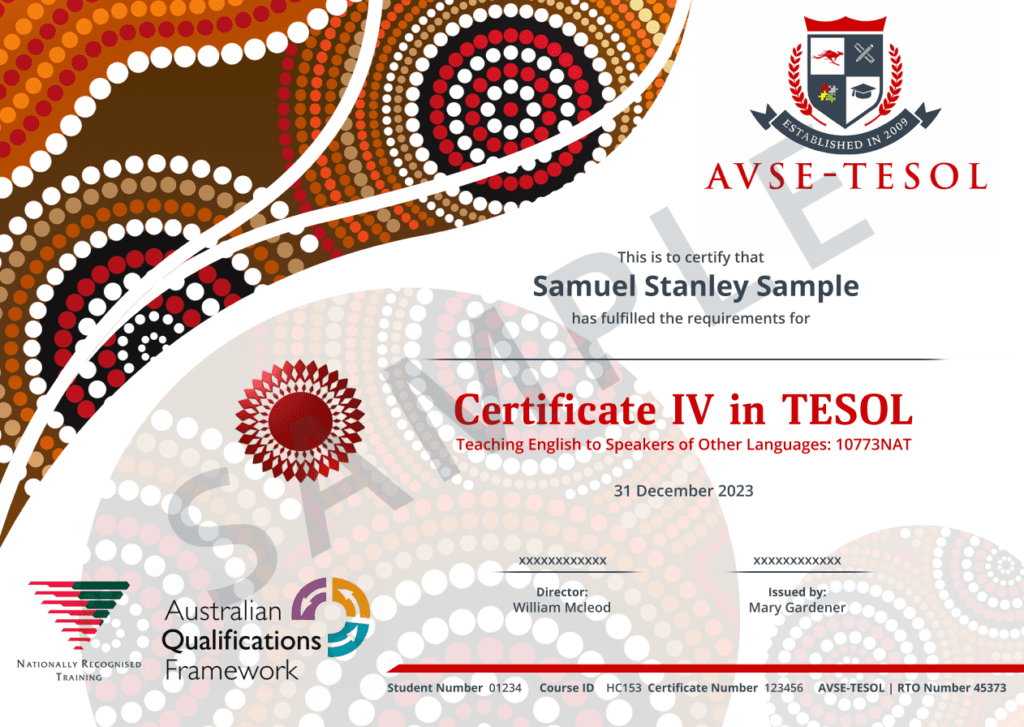Pretty much daily at AVSE-TESOL, we’ll receive a phone call or an email from a well-meaning person asking if they can ‘teach in Vietnam without a degree’ or a variation of the same question. You’ll find plenty of information on the internet about this topic, but a sizable portion of what you discover will be outdated or written by people who have got their facts wrong. This short article aims to provide up-to-date information for folks keen to teach in Vietnam, but who don’t have a degree.
Vexing question
Is it possible to teach in Vietnam without a degree? It’s a vexing question. The short answer is ‘yes’, in the sense that ‘exception to the rule’ and varying interpretations of the rule in a developing country like Vietnam are more prevalent than literal compliance. Anecdotally, 20%+ of ESL teachers in Vietnam don’t have a degree. Many schools, mostly ‘mum and dad’ type operations, are delighted to have a foreign ‘teacher’ as a staff member, degree, or no degree.

If you adopt a literal interpretation of the current rules, without a bachelor’s degree or higher, you’d be relying on someone prepared to risk jail time by pulling a few strings to help you get a teaching job. Before Covid this was commonplace. In this ‘post-Covid’ era, the Work Permit landscape in Vietnam is very different. The word ‘strict’ comes to mind. Most ‘string pullers’ have taken their skill set elsewhere.
Eligibility for a Work Permit
It seems that any discussion on the question ‘can I teach in Vietnam without a degree’ warrants consideration of who’s eligible for a Work Permit. Remember, an application for a Work Permit must be sponsored by an employer, or in our line of work, a school. It’s also important to remember that a Work Permit and a visa are not the same in Vietnam; they are separate documents, each with a different purpose. But that’s a discussion for another day.
The minimum requirement for a foreigner to be granted a Work Permit in Vietnam to teach English is:
- a notarised and legalised copy of a legitimate University Degree – any discipline, from a Bachelor’s Degree through to a PhD
- a notarised and legalised copy of a legitimate teaching certificate – government-regulated TESOL, TEFL or CELTA certification
- a notarised and legalised copy of a national background (police) check from the applicant’s home country that’s not more than six months old – in certain instances, a (local) background check carried out by Vietnamese authorities will be sufficient
- a formal health check in Vietnam – typically arranged by the employer
- non-native English speakers (only) must also produce a notarised and legalised copy of official test results that show their proficiency in English is at C1 level (or higher) under the Common European Framework of Reference for Language (CEFR).
Here are the key takeaways from the minimum requirements for a foreigner to be granted a Work Permit in Vietnam: an Associate Degree isn’t enough, a bachelor’s degree or higher – alone – isn’t enough, the TESOL, TEFL or CELTA certificate must be a product of nationally recognised training (government-regulated) in the country of origin, the background check has a limited lifespan, the health check must take place in Vietnam, and non-native English speakers must produce proof of their proficiency in English at C1 level or higher.

Gosh, that’s a lot of information to grasp, further complicated by nothing in Vietnam being ‘black and white’. It’s best to check with qualified experts if you need a definitive answer on where your situation fits in a future Work Permit application in Vietnam. If things don’t work out for you in Vietnam because you don’t have a degree – all is not lost! Cambodia is an option. Holding a degree isn’t a requirement for a Work Permit and related visa in Cambodia – it’s a realistic alternative.
Summary
Is it possible to teach in Vietnam without a degree? People do in sizable numbers, but they shouldn’t. It’s not allowed – the law is pretty straightforward. The cornerstone of this discussion is eligibility (or otherwise) for a Work Permit. If you hold a Bachelor’s degree (or higher), quality teaching certification, a clear background check, CI (or higher) certification if you’re a non-native English speaker and you’re healthy, you’ve got every reason to think the Work Permit process in Vietnam will be ‘plain-sailing’. If, you’re unable to tick all the boxes for some reason, you’ll be relying on a ‘helping hand’ from one of those ‘string-pullers’ that I mentioned earlier.
About the writer: Peter Goudge is the Managing Director (and founder) of Australian Vocational Skills and Education (AVSE-TESOL) in Ho Chi Minh City, Hanoi, Phnom Penh and Online. TESOL certification (Australian Government accredited) through AVSE-TESOL provides aspiring ESL teachers with the skills, knowledge and certification they need for ESL teaching jobs in Vietnam, Cambodia and elsewhere in the world. Here is a link to the AVSE website: www.avse.edu.vn
If I can’t teach in Vietnam without a degree, what’s my best option?
In the blog post immediately above on this page, I shined a light on whether it’s possible to teach in Vietnam without a degree. The conclusion was – it’s possible, but you might find yourself on the wrong side of the law. If you’re a cautious person, it’s likely that you’re of wary transgressing the law in a foreign country. I’m with you on that point. Here’s an alternative for you to consider. Teach English in Cambodia; it’s right next door.
Realistic option
You’ll be pleased to know that having a university degree is not a core requirement to teach legally in Cambodia and be paid for your efforts. You will need quality, government-regulated TESOL certification – AVSE-TESOL’s core business. Importantly, AVSE-TESOL has a TESOL Training Centre in the centre of Phnom Penh, where most ESL teaching jobs in Cambodia are located.
With Australian Government-accredited TESOL Certification from AVSE-TESOL in Phnom Penh, you can realistically expect to be in a top teaching job in Cambodia within days of completing the four-week course – with or without a university degree. What do I mean by a ‘brilliant teaching job’? Simple, a job that pays market rates for a foreign teacher, involves sensible work hours and comes with a safe teaching and learning environment. Most foreign teachers in Cambodia can save US $500.00+ a month without cutting corners because the cost of living is low.
Why is it so complicated to teach English in Vietnam without a degree, whereas teaching in Cambodia without a degree is a ‘slam dunk’? Good question! I think it has to do with the stage of development. It’s fair to say that Vietnam’s systems, processes, rules and regulations are more in line with the outside world. It could be argued that Cambodia is the last frontier for ESL teaching and learning. This directly translates to brilliant ESL teaching jobs for people like you and me – right now. There are many more ESL teaching jobs on offer in Cambodia than there are TESOL, TEFL or CELTA-qualified folks to fill them.

Teaching jobs galore – right now
History tells us that when the word gets out about a new frontier, people from near and far make a beeline for a slice of the action. In the sixteen years I’ve been in the Southeast Asia, there has been a noticeable increase in the number of prospective ESL teachers and practicing ESL teachers in Cambodia, especially during the two years leading up to Covid. When Covid hit, there was a mass exodus of ESL teachers. Some have made their way back to Cambodia in the ‘post covid’ period that we’re currently in, but I’m guessing that 80% (+/-) haven’t returned. Again, this directly translates into an abundance of ESL job opportunities in Cambodia.
No to a university degree, yes to government-regulated TESOL, TEFL or CELTA, what other documents will the Work Permit bureaucrats and schools expect you to produce for teaching in Cambodia? Did I hear you say “a background check”? Correct, a background check from your home country that was issued no more than six months before the day it’s presented. With more than 80% of ESL students in Cambodia (and Vietnam) being young learners aged between 4 and 17, the authorities want to know a thing or two about your history. It won’t automatically be a deal breaker if you have a black mark in your past. From my observations, most schools in Cambodia accept ‘there for the grace of god go I’; the seriousness of the offence and when it occurred will be considered.

How do I get a background (police) check? It varies from country to country, but the Department of Justice in your home country is a good place to start. Background checks typically come with a fee and take a month or so to process. It can be bureaucratic, but it’s manageable.
Summary
It’s true that teaching in Vietnam is fantastic, but if you don’t have a degree – and you want complete peace of mind – teaching in Cambodia is a realistic alternative and equally fantastic. With quality, Australian Government regulated TESOL certification from AVSE-TESOL in Phnom Penh and a clear background check, you’ll be teaching in Cambodia quicker than you think.
About the writer: Peter Goudge is the Managing Director and owner of AVSE-TESOL in Vietnam and Cambodia. AVSE-TESOL has been delivering Australian Government accredited TESOL programmes in Hanoi, Ho Chi Minh City and Phnom Penh for over a decade. Check out the AVSE-TESOL website: www.avse.edu.vn


For argument sake if I were to complete my degree at Cambodia will be notarized or I will need to be in my country for it to be a success?
Each country has it’s own policy with notarising documents. You should check with the Department of Foreign Affairs (or similar) in your country to check what’s possible and what’s not. Best of luck. Kind regards, Peter Goudge